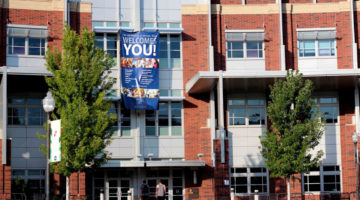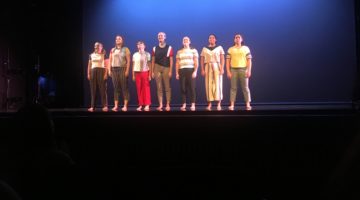 The University of Nevada, Reno, Theatre Department will be performing “Family Portrait” Mar. 3-4 and 8-11 at 7:30 p.m. and Mar. 5 at 1:30 p.m. “Family Portrait” was translated into English and is being directed by Jessica Nakamura, Assistant Professor of Theatre in the Department of Theatre and Dance at UNR.
The University of Nevada, Reno, Theatre Department will be performing “Family Portrait” Mar. 3-4 and 8-11 at 7:30 p.m. and Mar. 5 at 1:30 p.m. “Family Portrait” was translated into English and is being directed by Jessica Nakamura, Assistant Professor of Theatre in the Department of Theatre and Dance at UNR.
“The play takes place in the here and now and follows twelve characters as they try and fail to communicate with each other,” Nakamura said. “The play follows as communication breaks down and chaos ensues.”
Claire Hachenberger plays ‘mother,’ a middle-aged former teacher struggling to overcome her social and physical ineptitudes in order to form compassion with her introverted son. Hachenberger is a senior at UNR graduating with a B.A. in theatre this spring.
Samuel Crabtree plays ‘son,’ who is unable to handle the pressures of everyday life and becomes a recluse. Crabtree is a freshman double-majoring in theatre acting and English writing and double minoring in music and time-based media (videography).
Charis Nixon plays the ‘woman,’ an eccentric companion to the ‘son’ who wavers the line between reality and imagination. Nixon is a second-year journalism student, minoring in theatre. Although she has acted for twelve years, “Family Portrait” is her first UNR production.
Amari Callaway plays the ‘shoplifter,’ a troubled youth haunted by ostracization to the point of self-harm who discovers human connection with the ‘shop manager.’ Callaway is graduating from UNR this spring with a bachelor’s in Theatre and Studio Art, with an emphasis on costume design.
Justin Tanks plays ‘shop manager,’ who becomes disillusioned with the insincere optimism incorporated into his own business. Tanks is a senior at UNR.
The characters do not have proper names but are instead identified by ambiguous labels.
“It’s transcendent: the title can be applied to anyone in real life,” Hachenberger said. “It is not about the actual name but more about the relationship to others in society. It’s so the audience can take away the character and reflect on people in society that are similar to the characters. “
“They have really developed complex, nuanced characters and have contributed quite a bit to the production,” Nakamura said. “In particular, Assistant Director Jonathan Tsai has been an invaluable resource in contributing ideas and running rehearsal. The production would not be possible without him.”
Originally from Las Vegas, Tsai came to Reno to study theatre.
The cast and crew had four weeks of rehearsals. Although this is relatively short time to prepare in the student theatre world, they managed to cover a lot of ground.
“It’s been a wonderful experience, and the fact that the show is broken up into many little scenes with different characters also made for an interesting rehearsal process,” Callaway said. “Because we would only rehearse the scenes we were in, I frequently didn’t have much interaction with actors that I’m not in scenes with, which also lends itself to the theme of human connection or lack thereof.”
The play is being performed in the round, a theatrical technique where the audience surrounds all sides of the stage. This comes with a unique set of benefits as well as complications.
“It’s much more difficult to block them out and stay focused on what’s happening onstage since the audience is very close and visible,” Nixon said. “In the round, the audience is almost a part of the show. To overcome this challenge, we as actors have to remain completely focused on our scene partner and our character’s objective. It’s also challenging to make sure every audience member can see what’s going on at any given moment since each audience member sees the stage from a different angle. We as actors need to stay aware of our positioning onstage to make sure every audience member gets a good view.”
Tsai provides a technical perspective: “Arena staging is complex is many ways, but also quite simple once you get the hang of it. The primary goal is to have at least one actor’s face visible to every audience member so that nobody feels alienated or that they are missing out. This makes certain areas of the stage, such as the corners, particularly useful. The use of diagonals during interactions also helps to accomplish this task, which you will see throughout the entirety of the play.”
“I think the round configuration adds so much to this play,” Nakamura said. “It brings the audience closer to the action on stage and it also suggests that all may not be visible all the time.”
Originally written by Japanese playwright Shu Matsui, this will be the first time “Family Portrait” has been performed in English, with Nakamura as the sole translator. As with any translation, there may arise some cultural barriers to overcome.
“The play definitely falls on the absurdist side of the spectrum in certain scenes, so Dr. Nakamura had to really work with us to find our motivations and what our characters are trying to say,” Crabtree said. “It’s been a good experience, though, and I’m really happy that I got to be a part of it.”
“Watching a play that has been translated for the first time carries so many subtle perceptions we have about that culture,” Tanks said. “It also, in the same vein, shows all of the similarities that exist between two cultures.”
“Matsui is a leading contemporary playwright, regardless of being from Japan or not,” Nakamura said. “The original play is about Japanese contemporary life, but there are so many similarities between the problems in the play and problems here today. My hope is that people do not distance the action of the play because it is from Japan, but rather, think about how it relates to their lives.”
“Family Portrait” is being performed in the Redfield Studio Theatre. Tickets for UNR students are $5, UNR faculty/staff tickets are $10, children’s tickets are $10, senior tickets are $12 and general admission is $20.











